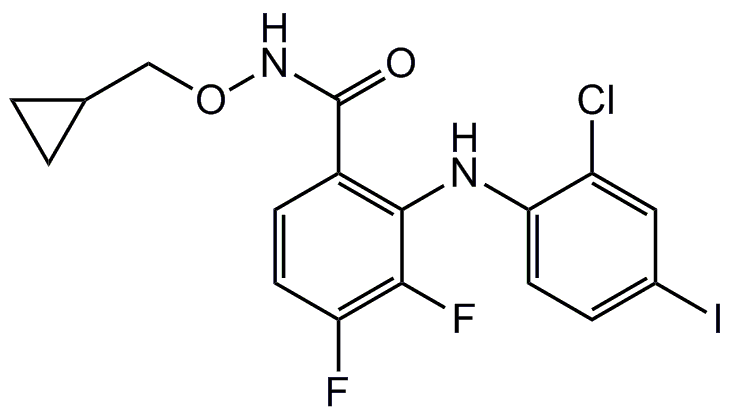
Chemical Structure
PD 184,352 [212631-79-3]

AG-CR1-0029
Overview
- SupplierAdipoGen Life Sciences
- Product NamePD 184,352 [212631-79-3]
- Delivery Days Customer10
- CAS Number212631-79-3
- CertificationResearch Use Only
- Estimated Purity>98%
- Hazard InformationWarning
- Molecular FormulaC17H14ClF2IN2O2
- Molecular Weight478.7
- Scientific DescriptionChemical. CAS: 212631-79-3. Formula: C17H14ClF2IN2O2. MW: 478.7. MEK (MAPKK) inhibitor. Potent and selective MAPK (ERK kinase 1; MEK1) activation inhibitor (IC50 = 300 nM in vitro, IC50 = 2 nM in vivo). Suppresses activation of MAPK but does not block its activity. Antiproliferative. Causes cell-cycle arrest in G1 phase. Tumor suppressor. Apoptosis inducer. - MEK (MAPKK) inhibitor [5]. Potent and selective MAPK (ERK kinase 1; MEK1) activation inhibitor (IC50 = 300 nM in vitro, IC50 = 2 nM in vivo) [1, 2]. Suppresses activation of MAPK but does not block its activity [3]. Antiproliferative [4]. Causes cell-cycle arrest in G1 phase [4]. Tumor suppressor [1, 5]. Apoptosis inducer [6].
- SMILESFC1=C(F)C(NC2=CC=C(I)C=C2Cl)=C(C=C1)C(=O)NOCC1CC1
- Storage Instruction-20°C,2°C to 8°C
- UNSPSC12352200
References
- Blockade of the MAP kinase pathway suppresses growth of colon tumors in vivo: J.S. Sebolt-Leopold, et al.; Nat. Med. 5, 810 (1999)
- Specificity and mechanism of action of some commonly used protein kinase inhibitors: S.P. Davies, et al.; Biochem. J. 351, 95 (2000)
- Identification of a novel mitogen-activated protein kinase kinase activation domain recognized by the inhibitor PD 184352: A.M. Delaney, et al.; Mol. Cell. Biol. 22, 7593 (2002)
- Cell-cycle arrest by PD184352 requires inhibition of extracellular signal-regulated kinases (ERK) 1/2 but not ERK5/BMK1: M.S. Squires, et al.; Biochem. J. 366, 673 (2002)
- CI-1040 (PD184352), a targeted signal transduction inhibitor of MEK (MAPKK): L.F. Allen, et al.; Semin. Oncol. 30, 105 (2003) (Review)
- The mitogen-activated protein kinase/extracellular signal-regulated kinase kinase inhibitor PD184352 (CI-1040) selectively induces apoptosis in malignant schwannoma cell lines: R.R. Mattingly, et al.; J. Pharmacol. Exp. Ther. 316, 456 (2006)
